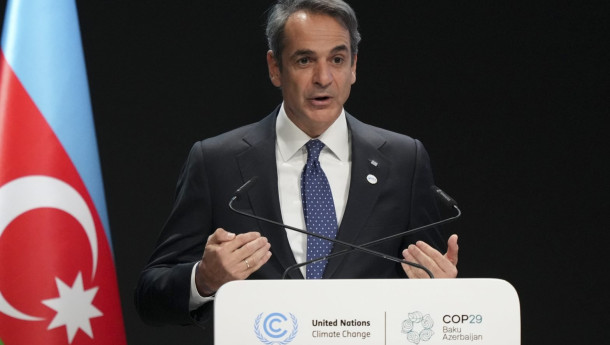
In the wake of a spate of deadly fires and floods in Greece in 2023, record heat waves in 2024 and near-summer temperatures in autumn, Prime Minister Kyriakos Mitsotakis warned at a world climate change event that Europe must react.
“Europe and the world must be more honest about the trade offs involved in the energy transition. Yes, the energy transition will, in the long run, lower costs, but this transition will not be painless,” Mitsotakis said at the United Nations COP29 climate summit in Baku, the capital of Azerbaijan.
“We need to ask hard questions about a path that goes very fast at the expense of our competitiveness, and a path that goes somewhat slower but allows our industry to adapt and to thrive. It is our responsibility to weigh these trade offs carefully, not to whisk them away,” he said.
“We need more resources to prepare to respond in time, in order to save lives and livelihoods and to help people and communities rebuild after disaster,” he added, although the event offered no answers.
“Our citizens are faced with unprecedented climate shocks, we need more resources to prepare to respond in time, in order to save lives and livelihoods and to help people and communities rebuild after disaster. We cannot focus so much on 2050 that we forget 2024.”
That was in reference to a number of previous similar events bringing only window dressing solutions that haven’t worked and world leaders continually kicking the can down the road to let future generations deal with it, if anything’s left.
The conference comes soon after deadly floods in Valencia, Spain as well and as a Dutch court ruled that Shell oil and energy company could continue to pollute, a main source of emissions speeding potentially catastrophic climate change.
Greece, along with many other countries, is also experiencing drought that’s drying up water supply sources, and the death of wild horses and Mitsotakis earlier said climate change was the reason for so many wildfires.
But the leaders of the 13 largest carbon dioxide-polluting countries snubbed the conference although they are responsible for more than 70 percent of 2023’s heat-trapping gases – including China and the US – making the event moot.
“Over the past year, catastrophic floods in Spain, Bosnia and Herzegovina as well as in southern Croatia have shown the devastating impact of rising temperatures,” said Croatia’s Prime Minister Andrej Plenkovic. “The Mediterranean, one of the most vulnerable regions, calls for urgent action.”
British Prime Minister Keir Starmer was there, and he announced an 81 percent emissions reduction target on 1990 levels by 2035, in line with the Paris Agreement goal to limit warming to 1.5 degrees Celsius (2.7 degrees Fahrenheit) above pre-industrial times, up from the United Kingdom’s 78 percent pledge.
A number of similar previous events have set similar goals that haven’t been met and keep being changed, with environmentalists and critics saying world governments aren’t serious about the crisis and oil still the world’s energy source.
The 2021 Paris Agreement’s goal was to hold “the increase in the global average temperature to well below 2°C above pre-industrial levels” and pursue efforts “to limit the temperature increase to 1.5°C above pre-industrial levels.”
But world leaders have stressed the need to limit global warming to 1.5°C by the end of the 21st Century because the UN’s Intergovernmental Panel on Climate Change said passing a 1.5°C threshold risks unleashing more severe climate change impacts, including more frequent and severe droughts, heatwaves and rainfall.
The main focus of this year’s talks is climate finance – wealthier nations compensating poor countries for damages from climate change’s weather extremes, helping them pay to transition their economies away from fossil fuels and helping them with adaptation.














 3287.99
3287.99 1275.09
1275.09